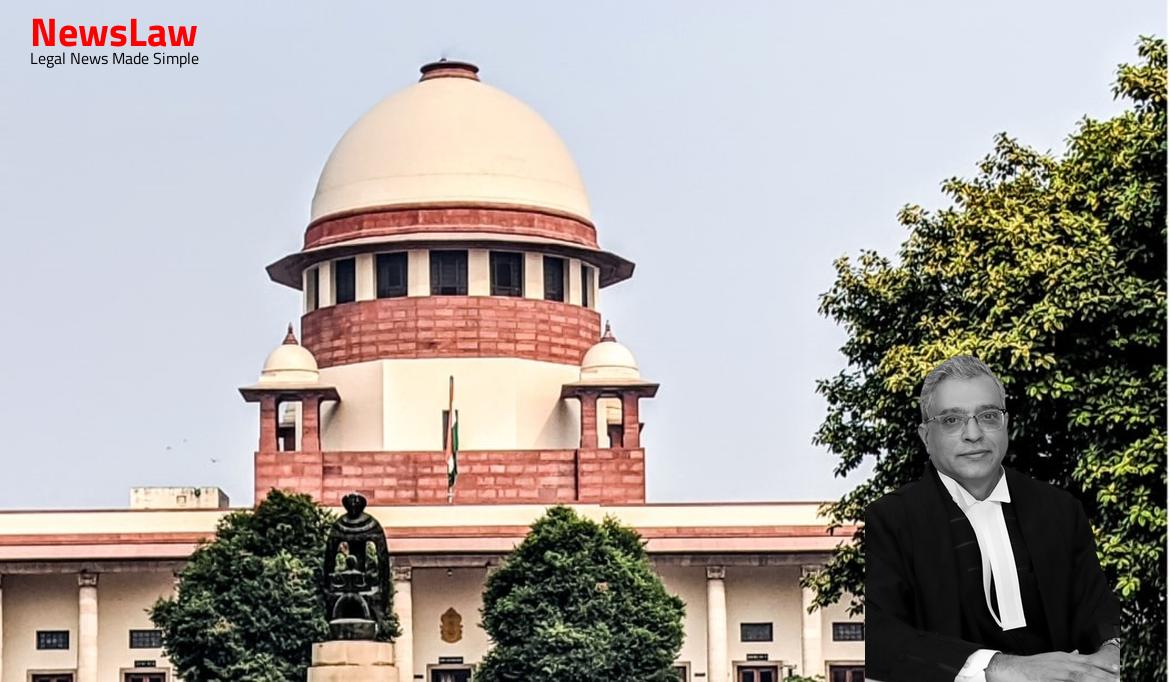Explore the nuanced legal analysis conducted by the High Court regarding the quashing of proceedings in serious offenses. The court’s examination of the timing of settlements, the stage of evidence, and the consent of the involved parties provides valuable insights into the judicial decision-making process. Follow the intricate balance between upholding justice and considering individual circumstances in the legal system.
Facts
- High Court dismissed the petition filed by the appellant.
- Both the appellant and Respondent No.2 were directed to personally appear in Court.
- Allegations of rape were made after the mentioned incident.
- Chargesheet has been filed in both cases arising from FIR No.824 of 2020.
- Case related to Section 376 IPC was settled amicably, leading to a quashing petition under Section 482 Cr.P.C.
- Appellant and Respondent No.2 are present in Court as per the direction.
- Another FIR was lodged by the present appellant against Respondent No.2 for extortion.
- FIR No. 569 of 2020 registered on 25.08.2020 based on a complaint by Respondent No. 2.
- Respondent No. 2 met with an accident in February 2020, leading to financial distress.
- She was searching for a job and came to know about a personal assistant position with the appellant.
- Exchange of messages between the respondent and the appellant ensued, leading to a meeting at the respondent’s house.
Also Read: Presumption of Genuine Endorsements in Cheque Case
Arguments
- Argued by the petitioner that in case of serious and heinous crimes, the Court should not allow quashing of proceedings even with consent between parties.
Also Read: Medical Negligence and Compensation: A Landmark Decision
Analysis
- The Court can be swayed by the settlement resulting in harmony between parties.
- In cases where charge is framed but evidence hasn’t started, High Court can exercise powers favorably after prima facie assessment.
- Consent given by Respondent No.2 was voluntary and without coercion.
- Consideration of settlement resulting in harmony and improving mutual relationships is vital.
- High Court can assess nature of injuries, stage of evidence, and medical reports for guidance.
- Exercise caution in quashing proceedings of heinous offenses but not precluded from examining evidence.
- Timing of settlement crucial in High Court’s decision under Section 482 of the Code.
- High Court may be liberal in accepting settlements for cases under investigation.
- Denial of settlement may burden already overburdened criminal courts.
- Respondent No.2 not supporting prosecution case may lead to inevitable acquittal.
- Importance of timing: settlements before trial may influence court decisions.
- Consideration of strong possibility of conviction or remote chances in quashing proceedings.
- Respondent No.2’s desire to end criminal proceedings for peaceful living.
- ASG highlighting legal position against quashing proceedings in serious offenses.
- Relevant to consider stage of proceedings in court decisions.
- Consent of Respondent No.2 for settlement was to be confirmed by learned ASG and counsel.
- High Court’s powers need to be examined during exercise
- Focus on whether the High Court has acted within the scope of its powers
- Though normally in serious crimes like rape, the Court does not quash proceedings, in this case, it was justified to do so to spare Respondent No. 2 from facing two trials.
- The appeal is allowed and the criminal proceedings from two FIRs related to rape and extortion are quashed and set aside.
- Gratitude expressed to the learned ASG and Mr. Rauf Rahim for assisting in verifying the respondent’s consent.
- All pending applications are disposed of.
Also Read: Remand of Writ Petition for Restoration and Decision on Merits
Case Title: KAPIL GUPTA Vs. STATE OF NCT OF DELHI (2022 INSC 814)
Case Number: Crl.A. No.-001217-001217 / 2022



